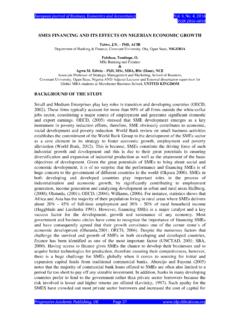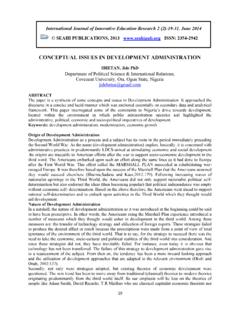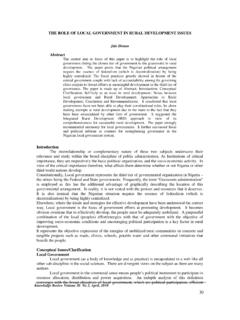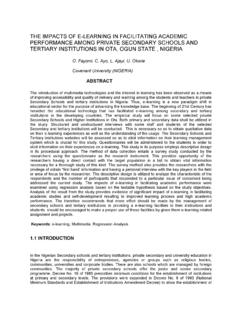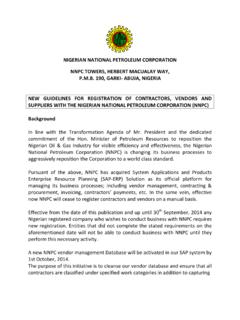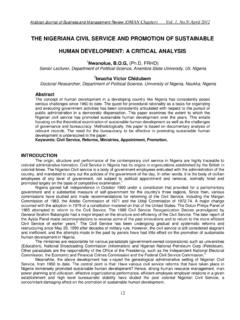Transcription of THE AGRICULTURAL SECTOR AND ECONOMIC …
1 THE AGRICULTURAL SECTOR AND ECONOMIC development : THE. nigerian EXPERIENCE. BY. MATTHEW, A. OLUWATOYIN. EMAIL: Department of Economics & development Studies, College of development Studies, Covenant University, Canaanland , Ota, Ogun State. And ADEGBOYE, B. FOLASADE. Department of Banking & Finance, College of development Studies, Covenant University, Canaanland, Ota, Ogun State. li P age Academic Background of the Authors MATTHEW, A. Oluwatoyin (Mrs). She has both (Hons.) and degrees in Economics from the University of Ado-Ekiti, Ekiti State and University of Ibadan, Ibadan, Oyo State respectively . She is currently pursuing her degree in Economics at the Covenant University, Canaanland, Ota, Ogun State where she also lectures in the Department of Economics and development Studies. She teaches courses like Microeconomic and Macroeconomic Theory, Mathematics and Statistics for Business and Social Sciences. She is married with children. ADEGBOYE, B.
2 Folasade (Mrs). Mrs. Adegboye, Folashade Bosede obtained the Bachelor of Science degree in Accounting from University of Ilorin and Finance from University of Lagos. She is currently pursuing a PhD. degree in Finance with Covenant University. Her area of interest is in International Finance. She is an Associate member of the Chartered Institute of Bankers of Nigeria and she is happily married with children. ZI Pag e ABSTRACT. Agriculture constitutes the predominant activity in most of the six geo-political zones in Nigeria, the percentage of persons engaged in the AGRICULTURAL SECTOR ranges between and per cent across zones in Nigeria. With respect to states, the activity ranges between and per cent, majority of states having over 50 percent. Food is one of the basic necessities of life hence the need to encourage agriculture . It is in this vein that, this study examines the role of the AGRICULTURAL SECTOR in ECONOMIC development . The empirical data used in this study was from 1970 to 2008 , the Johansen Co-integration technique of regression was used to analyze the data.
3 The results show that, there is no significant impact of the AGRICULTURAL SECTOR on ECONOMIC development in Nigeria. The study recommends that research and technology would drive AGRICULTURAL development and increase AGRICULTURAL productivity and that the Govenm1ent should establish AGRICULTURAL fund to finance and facilitate medium/large scale AGRICULTURAL production, to enhance employment, production for local consumption and for export. Therefore, the study concludes that any policy thrust that addresses poverty would inevitably focus on agriculture, by increasing rural opportunities that could generate AGRICULTURAL induced development . Hence, the development of agriculture is a sine qua non for the alleviation of poverty and achievement of sustainable development . Keywords: AGRICULTURAL SECTOR , ECONOMIC development , Research and Technology. 3I P age INTRODUCTION. Agriculture is the predominant activity in most of the zones in Nigeria, percentage of persons working in agriculture ranges between and percent across zones in Nigeria.
4 With respect to states, the activity ranges between and per cent, majority of states having over 50 percent. Increases in AGRICULTURAL output brought about by increasing land and labour productivity, will make food cheaper; benefit both rural and urban poor people who spend much of their income on food . Under right condition, increase in agriculture productivity causes the incomes of both small and large farmers to increase and generate employment opportunities. These increases in income is pmiicularly important because the proportion of people mainly dependent on agriculture for their income remains high; ranging from 45% in East and South Asia, to in Asia and in Sub-Saharan Africa (Ogen, 2007). The AGRICULTURAL SECTOR has a traditional role to play in the path of ECONOMIC development . But in an economy like Nigeria, the AGRICULTURAL SECTOR had suffered set back in recent times, which has attributed to widespread poverty and insecurity experienced today.
5 Though, no so-called developed nation today actualized this status solely by AGRICULTURAL transformation, but in many, conscious efforts on agriculture at the early stage of development played a critical role in ECONOMIC development . Moreover, rapid increase in AGRICULTURAL output by increasing land and labour productivity will make food cheaper benefiting both the urban and rural poor people who spend much of their income on food . Increasing productivity will bring about increased incomes of both farmers and even non-farmers, because the proportion of people mainly dependent directly or indirectly on agriculture and AGRICULTURAL products for their income remains extremely high. The hypothesi s of this study (stated in its null form) is: Ho: AGRICULTURAL SECTOR has no significant impact on ECONOMIC development ofNigeria. It is with this quest for recent empirical-econometric facts that motivated this study, poised with the aim of findin g out how AGRICULTURAL output can help to reduce, if not eliminate poverty and enhance growth and thus development .
6 It is equally aimed at providing policy information for the government. Time series data from 1970-2008 for the variables from the relevant data sources would be gotten and the Johansen Technique will be used to get the regression results. 41P age The remaining part of the study is structured as follows: next is literature review, followed by the theoretical framework. Methodology and analysis of data are in Section IV. Conclusion is in the last section. LITERATURE REVIEW. The nigerian economy, like that of Brazil during the first decade after independence, could reasonably be described as an AGRICULTURAL economy because agriculture served as the engine of growth of the overall economy (Ogen, 2007). From the standpoint of occupational distribution and contribution to the GDP, agriculture was the leading SECTOR . During this period Nigeria was the world's second largest producer of cocoa, largest exporter of palm kernel and largest producer and exporter of palm oil.
7 Nigeria was also a leading exporter of other maj or commodities such as cotton, groundnut, rubber and hides and skins (Alkali, 1997). The AGRICULTURAL SECTOR contributed over 60% of the GDP in the 1960s and despite the reliance of nigerian peasant farmers on traditional tools and indigenous farming methods, these farm ers produced 70% of Nigeria's exports and 95% of its food needs (Lawai, 1997). However, the AGRICULTURAL SECTOR suffered neglect during the hey-days of the oil boom in the 1970s. Since then Nigeria has been witnessing extreme poverty and the insufficiency of basic food items. THE ROLE OF AGRICULTURE IN ECONOMIC development . At independence in 1960 agriculture accounted for well over half of our Gross Domestic Product (GDP), and was the main source of export earnings and public revenue, with the AGRICULTURAL marketing boards playing a leading role, but today this leading role in the economy has been taken over by the national oil company, the nigerian National Petroleum Company (NNPC).
8 According to the Central Bank of Nigeria' s data (2003), Oil still accounts for our major revenue (gearing towards 80%) and almost 100% of our export earnings. Although Agriculture (particularly forestry, livestock and fishing) is shown to serve as the major activity of the majority of Nigerians; it is clear that we indulge in agriculture purely as personal survival strategies rather than as a calculated effort to warming the engine of our countries economy. Thi s is really where our National ECONOMIC problem lies. The gospel of ECONOMIC salvation cannot be preached without due regard to AGRICULTURAL development . Agriculture is the major and most certain path to ECONOMIC growth and 5I P age sustainability. It encompasses all aspect of human activities - being the art, act, a cultural necessity and science of production of goods through cultivation of land and management of plants and animal s which creates an activity web-chain that satisfies social and ECONOMIC needs.
9 Agriculture is the mainstay of mankind ; therefore wise nations all over the globe give it a priority by developing and exploiting this SECTOR for the upkeep of their teeming populations through the earning of revenue for development purposes; as well as employment for the stemming down crimes, corruption and other forms of indiscipline which work against all factors of life, living and most of all ECONOMIC production. While many nations in the world are working hard and reaping their harvests in this direction, Nigeria happens to belong among the few that have greatly retarded from their past glorious heights in agriculture, down to a near zero scale of AGRICULTURAL production. Surely, this neglect is because of irresponsible and ill-purposeful leadership (Chigbu, 2005). Nigeria is blessed with a wide variety of AGRICULTURAL potentials, ranging from varieties of crops to varieties of animals and plants and natural AGRICULTURAL -supportive factors like forests, waters, sands and most of all human resources that are being under-used (or not even used as at now).
10 We have it all , yet we lack it all; and that is why we are hungry in the face of plenty to eat. How can our Nation grow well if we cannot cultivate and manufacture our own food ? Nigeria's ECONOMIC development can only be realistic through the total resuscitation of our AGRICULTURAL SECTOR . This will propel the SECTOR to produce food and fibres to feed our people and the industry at a rate faster than the birth-rate; yet reducing the death rate. The injection of vigour into the AGRICULTURAL SECTOR will also fasten the creation of self-reliance, self-contentment and self- sufficiency (which will be translated to National sufficiency). Adequate supply of raw materials for industries, increased foreign reserve; and increase in the export of non-oil commodities and improvement in the standard of living of the masses are issues that a revitalized AGRICULTURAL system can provide. This will encourage the growth of a physically fit and mentally alert population.
